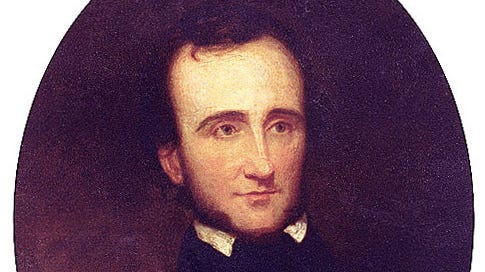In ‘Tale of the Wife of Bath’, Geoffrey Chaucer wrote:
In the olden days of King Arthur,
Of which Britons speak with great honor,
All this land was filled full of faerie.
The Elf-queen, with her jolly company,
Danced full oft in many a green mead.
This was the old opinion, as I read;
I speak of many hundred years ago.
But now no man sees elves any more.
And perhaps, the reason why no one can see elves anymore, is not that elves aren’t there for us to see, but that we simply don’t look for elves anymore. We seem to be afraid to try to look for them, or maybe we’re simply afraid to look into the unknown. There is no magic or secrets needed, but only an imagination that needs to have the courage to take ‘a sufficiently informed and planned leap into the unknown’.
During his lifetime, Edgar Poe would publish four volumes of his poems. The first volume of his poems of youth was published anonymously at his own expense – ‘Tamerlane and other Poems, by a Bostonian’, in 1827. Two years later, ‘Al Aaraaf, Tamerlane, and Minor Poems, by Edgar A. Poe’ was published, in 1829, followed by ‘Poems by Edgar A. Poe’, in 1831, and lastly, ‘The Raven and Other Poems, by Edgar A. Poe’, in 1845. Plus, a number of his unpublished poems would appear in ‘The Works of the late Edgar Allan Poe’, published by N.P. Willis, J.R. Lowell, and R.W. Griswold, in 1850.
Except for his two longer poems, ‘Tamerlane’ and ‘Al Aaraaf’, let’s take a look at all the others, and take a planned leap into the unknown genius of Edgar A. Poe.
1. Song
[from ‘The Raven and other Poems’]
Portrait of Edgar A. Poe by Samuel Osgood (1845)
There are two version of this poem: the first ‘To — —’ from ‘Tamerlane and other Poems’ (1827), and the second, slightly altered, ‘Song’ from ‘The Raven and other Poems’ (1845).
I saw thee on thy bridal day –
When a burning blush came o’er thee,
Though happiness around thee lay,
The world all love before thee.
And in thine eye a kindling light
(Whatever it might be)
Was all on earth my chained sight
Of Loveliness could see.
That blush, perhaps, was maiden shame –
As such it well may pass –
Though its glow hath raised a fiercer flame
In the breast of him, alas!
Who saw thee on that bridal day,
When that deep blush would come o’er thee,
Though happiness around thee lay,
The world all love before thee.
Notes: What caused this ‘blush’ of our bride? What was this ‘shame’ of hers? What caused a ‘fiercer flame’ in him?
One story tells of a young man (Poe himself, perhaps) and young woman, whose love was not approved by the young woman’s father, because of the young man’s too low social status. Later, that young man, after having left town, returned one day – but on the day of his former girl friend’s wedding day! - to someone else!
[next week - 2. Dreams]



